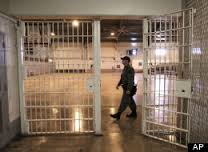The US imprisons over 2.4 million people. According to a Pew study published in 2011, between 1973 and 2009, the nation’s prison population grew by 705%. We now imprison more people than any other country in the world – more than China or Russia.And locking all these people up doesn’t come cheap. We spend over $52 billion annually on prisons – that’s more than the annual GDPs of Jamaica and Nicaragua combined.If we are spending so much money that means our system must be working, right? Not necessarily. One way the effectiveness of prison is determined is the rate at which prisoners re-offend when released. 2011, between 1973 and 2009, the nation’s prison population grew by 705%. We now imprison more people than any other country in the world – more than China or Russia.And locking all these people up doesn’t come cheap. We spend over $52 billion annually on prisons – that’s more than the annual GDPs of Jamaica and Nicaragua combined.If we are spending so much money that means our system must be working, right? Not necessarily. One way the effectiveness of prison is determined is the rate at which prisoners re-offend when released.
Research shows that almost half of U.S prisoners re-offend. Why? All the factors that lead to imprisonment in the first place: poverty, drugs, instability and violence. If we don’t give prisoners the tools to combat these obstacles when they exit, they too-often end up right back in prison. In the words of Minnesota Commissioner of Corrections Tom Roy, “Catching the guy and prosecuting him is really important work, but if we don’t do anything with that individual after we’ve got him, then shame on us. If all that effort goes to waste and we just open the doors five years later, and it’s the same guy walking out the door and the same criminal thinking, we’ve failed in our mission.” So how can we reduce recidivism? Education. Access to higher education reduces recidivism by 46%.
Kevin Miller, a former prisoner, testified in favor of the bill. “I am a living, breathing, example of what post-secondary education can do for an inmate,” he said. “I believe that a certain amount of prison time should be punitive. But if there is not the opportunity for growth and change then there is no shot at reforming a person. When an inmate exits and brings a resume to an employer the scales are tipped against us. Higher education restores balance to those scales. It shows an employer than an inmate has made a great effort to better themselves.” Miller is currently finishing up his last quarter at WSU-Vancouver. Taxpayer’s dollars must be spent wisely. For every dollar you invest in education you get a $5 return: lower victim costs, lower court costs, lower law enforcement costs, lower prison costs. The average age of a prisoner in Washington state is 37 years old. That’s pretty young. If we don’t help prisoners to become productive citizens we will pay for it for years to come. |

